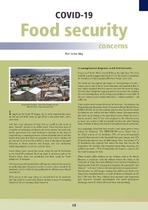| dc.description.abstract | It’s not as if South Africa started 2020 on the right foot. The latest
available numbers suggest that about 11% of the country’s population
(or around 6.5-million people) suffer from hunger every year.
We should not lose sight of the impact of unemployment on men –
hunger can be said to breed social discontent and instability. But it’s
now widely accepted that it is women who bear the brunt of crises.
Not only does the gender wage gap persist, but women also shoulder
the overwhelming share of the caring responsibility in households. If
they are without work, it’s likely that others – children included – will
suffer, too. | en_US |

